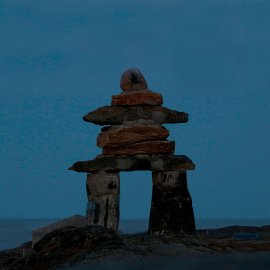Arctic Futures, Part Four: Health and Welfare of the Indigenous People of the Arctic
-
English
-
ListenPause
Welcome to World Ocean Radio… I’m Peter Neill, Director of the World Ocean Observatory. If a major principle for management and governance of the Arctic is the health and welfare of the indigenous population, what does that today look like? There have been various advances – a major treaty initiative by the United Nations to protect the rights of indigenous peoples and various declarations, policies, and specific actions by governments – Canada, Norway, and Denmark notable among them – that have defined political boundaries, provided certain autonomies, set up regional legislative bodies, and provided funds, frequently targeted, to address identified specific needs with identified specific solutions. The paternalism inherent in this process is obvious. And those filling those positions and executing those policies are caught in the middle of serving the agenda of the “paternal” government and providing something of value to their own communities. You see these good people at the international meetings presenting optimistic reports of limited success, sitting on panels surrounded by others, proudly wearing their traditional costumes, and doing their very best to represent a larger force in their favor that is to come. I always feel that there is evident in their behavior a terribly contradictory mix of possibility, ambivalence, and anger. At the center of these best intentions are the principles of equity and justice for the benefit of communities that have occupied these remote places for eons. But the reality is mostly different. The appointed indigenous officials have delimited power; the percentage of ownership in foreign-financed projects are minimal; the prospect of jobs and physical improvements less than promised; the local profit share small compared with the extraction and export of the natural and financial returns sent abroad. In all, barely tangible as a whisper of progress, respect, and rejuvenation. What really is left behind? Sustained poverty, unemployment and limited education, pollution, access to health care and counseling, family disruptions, alcoholism, drug addiction, the diminution of native language and cultural traditions, and increasing high incidence of suicide among young and old. What is actually taking place is an entropic social decline as quiet, relentless, and devastating as the parallel environmental decline brought about by climate change, exploitation of natural and financial capital, and the failure of government. In a 2015 report conducted by an Inuit non-governmental organization, published by Statistics Canada, the following were listed as determinants of higher mental distress among indigenous people: Quality of early childhood development, food security, housing, mental wellness, availability of health services, safety and security, income distribution, education, livelihood, culture and language – the full spectrum of social expectation that we in the developed world tend to take for granted. It may be difficult for us to imagine such conditions even in our own country, but they are certainly there, on the reservations and neighborhoods of the urban poor. Such a thing cannot stand we say, and we expect our government to do something effective about it as a demonstration of our values. Today I heard a most chilling proposal, that in the United States Native American reservations be “privatized” to be run by external corporations able to interpret historical treaty obligations, manage natural resource exploitation, and establish what would be a return to social repression and the assumption of all rights legitimately belonging to others. No indigenous people can expect to survive under these subversive conditions. Again and again, these communities and cultures have cried out for justice. They have rebelled, collaborated, initiated, and declared the legitimacy of their own traditions, moral principles, and solutions, to be met with an ongoing history of compromised and reactionary response – again and again – against their enduring interest. We will discuss these issues, and more, in future editions of World Ocean Radio. WORLD OCEAN RADIO IS DISTRIBUTED BY THE PUBLIC RADIO EXCHANGE AND THE PACIFICA NETWORK FOR USE BY COLLEGE AND COMMUNITY RADIO STATIONS WORLDWIDE. FIND US WHEREVER YOU LISTEN TO YOUR FAVORITE PODCASTS. IF YOU VALUE WORLD OCEAN RADIO, PLEASE CONSIDER BECOMING A PATREON SUPPORTER TODAY.
This week on World Ocean Radio: part four of a multi-part series on the Arctic. In this episode, host Peter Neill examines the rights of the indigenous peoples of the Arctic; their role in governance and their limited powers at the bargaining table; the realities of their health and welfare; and the myriad effects of management, policy, and outside interests by foreign governments.
About World Ocean Radio
Peter Neill, Director of the World Ocean Observatory and host of World Ocean Radio, provides coverage of a broad spectrum of ocean issues from science and education to advocacy and exemplary projects. World Ocean Radio, a project of the World Ocean Observatory, is a weekly series of five-minute audio essays available for syndicated use at no cost by college and community radio stations worldwide.
Image
Inukshuk in Rankin Inlet, Nunavut, Canada. Inukshuk are stone structures constructed to communicate with humans throughout the Arctic. Traditionally constructed by the Inuit, the word means “to act in the capacity of a human.”
- Login to post comments



